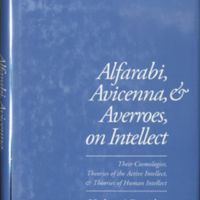Alfarabi, Avicenna, and Averroes, on Intellect: their cosmologies, theories of the active intellect, and theories of human intellect
Dublin Core
Title
Alfarabi, Avicenna, and Averroes, on Intellect: their cosmologies, theories of the active intellect, and theories of human intellect
Description
A study of problems revolving around the subject of intellect in the philosophies of Alfarabi (d. 950), Avicenna (980-1037), and Averroes (1126-1198), this book pays particular attention to the way in which these philosophers addressed the tangle of issues that grew up around the active intellect. Davidson starts by reviewing discussions in Greek and early Arabic philosophy that served as the background for the three Arabic thinkers. He examines the cosmologies and theories of human and active intellect of the three philosophers and covers such subjects as the emanation of the supernal realm from the First Cause, the emanation of the lower world from the transcendent active intellect, stages of human intellect, illumination of the human intellect by the transcendent active intellect, conjunction of the human intellect with the transcendent active intellect, prophecy, and human immortality. Davidson traces the impact of the three philosophers on medieval Jewish philosophy and Latin Scholasticism. He shows that the later medieval Jewish philosophers and the Scholastics had differing perceptions of Averroes because they happened to use works belonging to different periods of his philosophic career. This book will be of interest to the student and scholar in medieval philosophy, the history of philosophy, and medieval culture.
Creator
Herbert A. Davidson
Text Item Type Metadata
Original Format
Book
Citation
Herbert A. Davidson, “Alfarabi, Avicenna, and Averroes, on Intellect: their cosmologies, theories of the active intellect, and theories of human intellect,” Humanities Hub, accessed February 26, 2026, https://humanitieshub.sdsu.edu/omeka/items/show/414.

